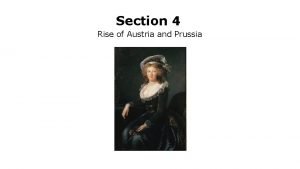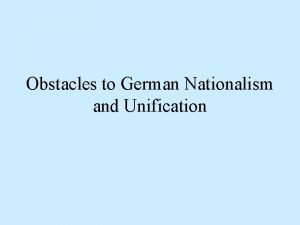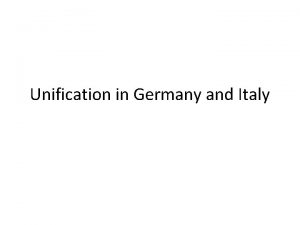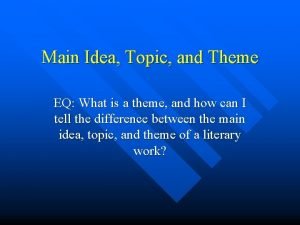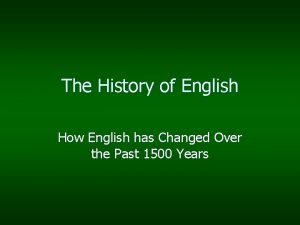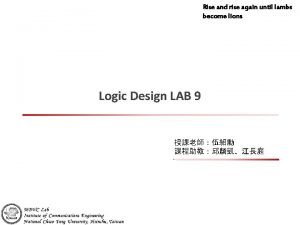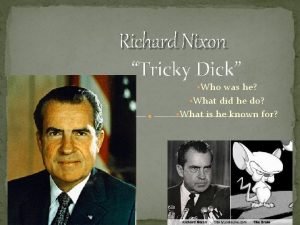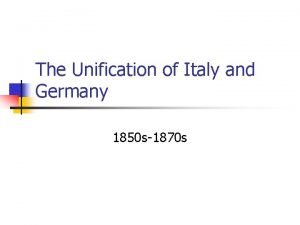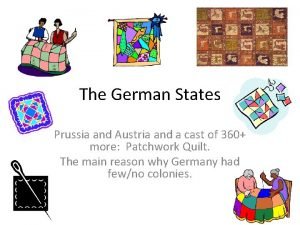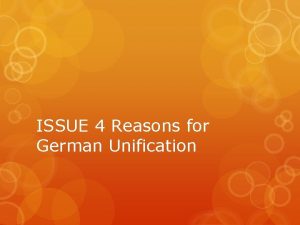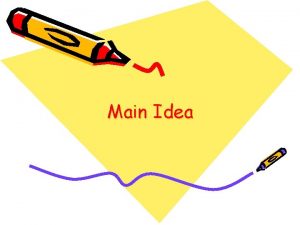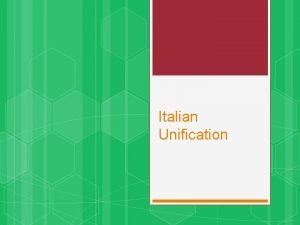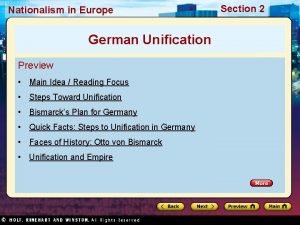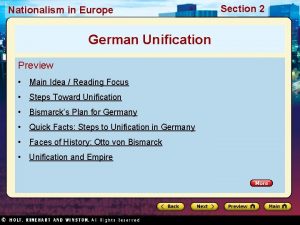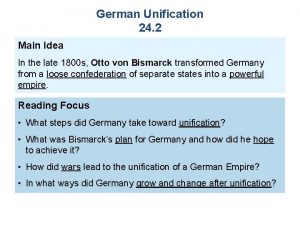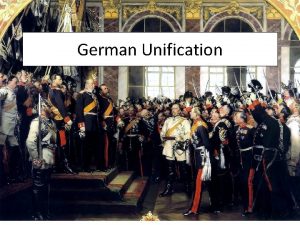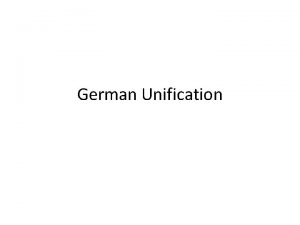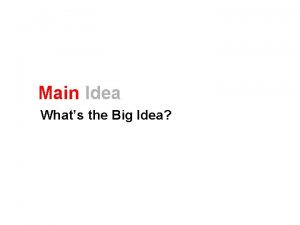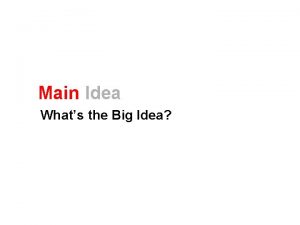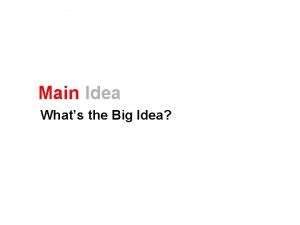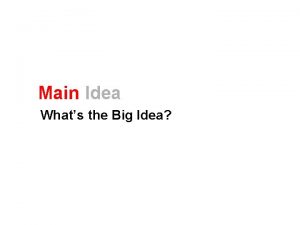German Unification The Rise of Prussia Main Idea



















- Slides: 19

German Unification The Rise of Prussia

Main Idea ▶ In the late 1800 s, Otto von Bismarck transformed Germany from a loose confederation of separate states into a powerful empire



German Confederation ▶ Formed in 1815 at the Congress of Vienna, replacing the Holy Roman Empire ▶ Loose confederation/political association of 39 states ▶ Two largest states dominating the confederation ▶ Prussia ▶ Austro-Hungarian Empire/ Austrian Empire

Austria/ Prussia Rivalry Austrian Empire Prussia ▶ Multinational Empire ▶ Primarily German population ▶ Major power in Europe ▶ Powerful army ▶ Authoritarian governmentstrong King ▶ Industrialized quickly ▶ Wars with France, Italy and Prussia

Basis for German Nationalism? ▶ German language ▶ 1834: Zollverein (Zol-va-reign) created ▶ ▶ Customs union that removed tariffs on products traded between German states (economic unity) ▶ By 1854, majority of Germany involved Cultural unity

Setting the Stage for German Unification ▶ ▶ Revolution of 1848 ▶ Liberal Revolution ▶ Desire for German unification grows Promise of reforms in Prussia ▶ ▶ Liberal reforms promised Creation of the Zollverein ▶ Economic alliance between the German states

Prussian Government KING WILHELM I PRIME MINISTER OTTO VON BISMARCK

Otto von Bismarck (1815 -1898) ▶ Prime Minister of Prussia 1862 -1890 ▶ Became chancellor of Northern German Confederation in 1867 ▶ “The Iron Chancellor” ▶ “The less people know about how laws and sausages are made, the better they’ll sleep at night”

Bismarck’s Philosophy ▶ Not liberal like revolutionaries; conservative, supported King of Prussia ▶ He believed Prussia was destined to lead the German people to unification ▶ Practiced realpolitik ▶ ▶ “Politics of reality” -> Practical -> Actual ▶ Tough power politics, no room for idealism (mind/spirit) Using “blood and iron” to gain German unification ▶ Builds up the Prussia army ▶ Getting ready for war

▶ “Germany does not look to Prussia’s liberalism, but to her power… Not by speeches and majorities will the great questions of the day be decided- that was the mistake of 1848 -1849 - but by iron and blood” ▶ - Otto von Bismarck

Creation of the Northern German Confederation (1867) ▶ After Austro-Prussian war ▶ Northern German states unite with Prussia to form North German Confederation ▶ ▶ Each state has self-government ▶ King of Prussia is president of Confederation Eliminates the German confederation, led in part by Austria

EMS Telegram ▶ King William responds to telegram from France ▶ Bismarck alters Williams’ response to make it sound like an insult ▶ Telegram is published, the French get angry ▶ France declares war on Prussia in June 1870 The telegram's contents outlined the details of a disagreement between Wilhelm and the French ambassador concerning the succession to the Spanish throne.

Franco-Prussian War (1870 -71) ▶ All German states joined in war against France ▶ No outside nation came to help France ▶ Short, but decisive war- German victory ▶ Results of war: ▶ French empire collapses ▶ France loses Alsace-Lorraine ▶ France pays Germany 5, 000, 000 francs ▶ German army occupies much of France

German Empire ▶ William I proclaimed Emperor of Germans at Versailles on January 18 th, 1871 ▶ Berlin becomes the empire’s capital ▶ Constitution that unites 25 German states in federal form of government ▶ Local government in each state ▶ Emperor (Kaiser) headed government with a large amount of power


Balance of Power Shifts ▶ 1815 - balance of power established with Five Great Powers (Britain, France, Russia, Prussia, Austria) ▶ Changes by 1871 ▶ Britain and Germany were the most powerful ▶ Austria, Russia and Italy were far behind; France is in the middle

Discussion Questions - With someone in your vicinity 1) What questions might you have after the film? 2) Looking back at history - what ideas do you have about what should have happened to the German High Command after the War? How about Nazi Party members or average German citizens? 3) Describe and list specific aspects of nationalism that you observed in the film. 4) The way that Nazi officers and soldiers were depicted in the film - describe what you think their loyalties and priorities were. 5) What are some of the regions of Europe where prisoners were brought from? 6) Finally, discuss whether you think it’s appropriate to tell this story through a mainstream film. What works well? What might be problematic? Should learning about WWII and The Holocaust remain in the curriculum for high school students? Why or why not?
 Rise of austria and prussia
Rise of austria and prussia How do you identify an implied main idea
How do you identify an implied main idea Obstacles to german unification
Obstacles to german unification Stages of german unification
Stages of german unification What was the most serious obstacle to german unification?
What was the most serious obstacle to german unification? German and italian unification compare and contrast
German and italian unification compare and contrast Supporting ideas
Supporting ideas Is the main idea the theme
Is the main idea the theme Irrelevant examples
Irrelevant examples Define central idea
Define central idea Low german vs high german
Low german vs high german A union b example
A union b example Rise and rise until lambs become lions
Rise and rise until lambs become lions Tricky dick: the rise and fall and rise of richard m. nixon
Tricky dick: the rise and fall and rise of richard m. nixon Little lambs academy
Little lambs academy Where was prussia in 1850
Where was prussia in 1850 Prussia
Prussia Lockheed martin codequest
Lockheed martin codequest Thirty years' war causes
Thirty years' war causes Prussia now
Prussia now
